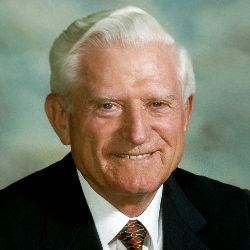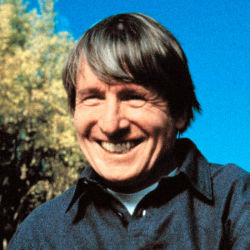In his letter to the editor (Nov. 2015) on Keith Kirkpatrick's news story "The Moral Challenges of Driverless Cars" (Aug. 2015), Hans Grünberger attacked my proposal for ethics review boards. The letter mischaracterizes my beliefs and my proposal.
CACM Staff
Gene Amdahl, who formulated Amdahl's Law and worked with IBM and others on developments related to mainframe computing, died recently from complications of pneumonia.
What About Statistical Relational Learning?
While Stuart Russell's review article "Unifying Logic and Probability" (July 2015) provided an excellent summary of a number of attempts to unify these two representations, it also gave an incomplete picture of the state of the art.
None of the three articles on the proposed Proceedings of the ACM (Sept. 2015) addressed what should be the fundamental concern for any publication: Who will actually read (and subscribe to) it?
John Henry Holland, a pioneer in the study of complex adaptive systems and of what became known as genetic algorithms, died in August at the age of 86.
One afternoon early in 1990, one of the 100 or so 4ESS switches that handled U.S. long-distance traffic at the time hit a glitch and executed some untested recovery code. In the process the switch dragged its neighboring switches down, and the process cascaded across the country.
May the Computational Force Be with You
There are many open questions in complexity theory concerning "a deeper reality below the one we perceive" that may be relevant, even fundamental, to Yannis Papakonstantinou's Viewpoint "Created Computed Universe" (June 2015).
Meg Leta Jones's "Forgetting Made (Too) Easy" (June 2015) raised an important concern about the Court of Justice of the European Union's Google Spain judgment. Google "is without any guidance as to which interests should trump others, when, and why," she wrote. This is not quite true.
Quality vs. Quantity in Faculty Publications
I applaud the Computing Research Association best practices memo Moshe Y. Vardi mentioned in his May 2015 Editor's Letter. However, more specific guidelines are needed for this initiative to be effective.
To Learn CS Principles, Start in the Cafeteria Line
Many computer science textbooks explore the concept of a last-in first-out stack by comparing it to the stack of plates in the cafeteria. Yet the plate-stack analogy is only the tip of the iceberg when it comes to computer science principles.
Shape the Future of Computing
ACM encourages its members to take a direct hand in shaping the future of the association. There are more ways than ever to get involved.
Get Involved




